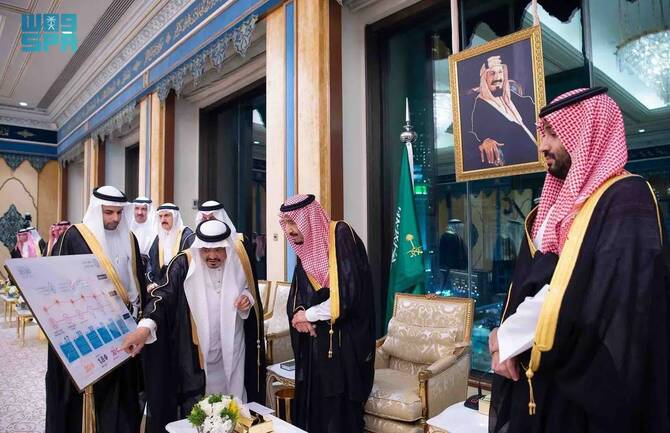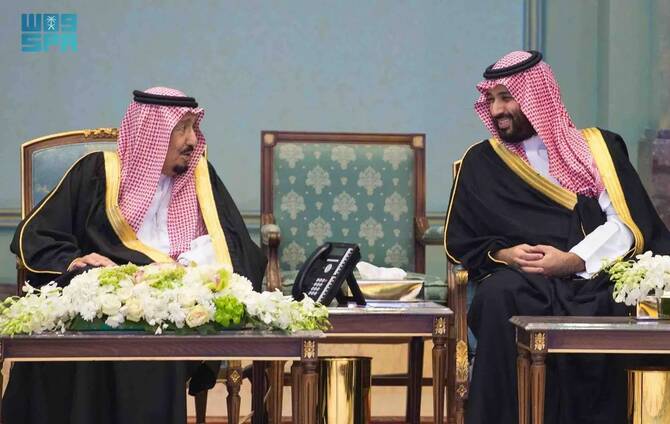RIYADH: Saudi Arabia’s achievements in less than a decade under the Vision 2030 program has made it a global model for transformation, King Salman said on Friday.
Speaking on the ninth anniversary of the announcement of the Kingdom’s widespread economic and social reforms, the king said the country will continue together the construction process to achieve more sustainable development for future generations.
“We praise God for the remarkable progress our nation has achieved in less than a decade – progress that has positioned Saudi Arabia as a global benchmark for transformation,” he said.
“We take great pride in the unwavering dedication of our citizens, whose efforts have laid the foundations for a new era of growth. Together, we carry the journey of progress forward, united in shaping the future of our country for generations to come,” he added.
Crown Prince Mohammed bin Salman said he was proud of what the nation had achieved under the program and that there was renewed determination to strengthen Saudi Arabia's position as a leading country in the world.
“Nine years into Vision 2030, we stand proud of what our people have accomplished,” Prince Mohammed said.
“They have turned ambition into action and goals into milestones. We have not only met key targets – we have surpassed many.
“Looking ahead, our resolve is stronger than ever. We will accelerate delivery, embrace every opportunity, and further elevate the Kingdom’s position as a global leader,” he added.
Kingdom Accelerates Toward Vision 2030: Record Achievements and Promising Indicators
A report released by the government to coincide with the anniversary said 85 percent of the more than 1,500 Vision 2030 initiatives had been completed or are on track, the Saudi Press Agency reported.
Eight goals of the program had been achieved six years ahead of time.
The Kingdom’s unemployment rate had dropped to a historic low, achieving the 2030 target of 7 percent and 2.4 million Saudi men and women now work in the private sector.
The private sector’s contribution to Saudi Arabia’s GDP has exceeded the 2024 target and the assets of the Kingdom’s Public Investment Fund (PIF) have more than tripled since Vision 2030 was launched.
The report said Saudi Arabia had advanced 20 places in the Global Competitiveness Index to 16th place. Saudi household ownership had reached more than 65 percent, exceeding the 2025 target.
International tourism revenues increased by 148 percent compared to 2019 and the agricultural sector has increased its contribution to the GDP, reaching 114 billion riyals.
Education has also been boosted with four Saudi universities now ranked among the top 500 universities in the world.
The Public Investment Fund (PIF) saw its assets under management triple to reach 3.53 trillion riyals ($940.8 billion), the report said.
Private sector participation has also strengthened, now accounting for 47 percent of the Kingdom’s gross domestic product, while the localization of the military industries sector advanced significantly, with local content reaching 19.35 percent, a major leap from just 7.7 percent in 2021.
The agricultural sector contributed 114 billion riyals to the national GDP in 2024.
Saudi Arabia’s appeal as a regional business hub continues to rise, with over 571 international companies now establishing their regional headquarters in the Kingdom.
By the end of 2024, over 850,000 Saudi families had achieved home ownership, contributing to a rise in overall home ownership rates among Saudi households, which reached 65.4 percent. This was up from 47 percent in 2016 and already surpassing the target for the year.
Healthcare coverage now extends to 96.4 percent of population centers, placing the Kingdom within striking distance of its 2030 goal of 99.5 percent.
The push for healthier lifestyles is bearing fruit, with 58.5 percent of adults now engaging in at least 150 minutes of weekly physical activity, above the 2024 target. Among children and adolescents, 18.7 percent meet the daily 60-minute activity recommendation. These efforts have contributed to a rise in average life expectancy, which now stands at 78.8 years, edging closer to the Vision 2030 target of 80 years.
Digital transformation in the justice sector has also increased, with 98 percent of litigation sessions conducted electronically in 2024, which amounts to over 2.3 million digital court hearings.
Additionally, more than 5.3 million electronic powers of attorney were issued, benefiting over six million individuals.
Saudi Arabia’s tourism and entertainment sectors saw growth in 2024, reinforcing the Kingdom’s ambition to become a global cultural and leisure destination.
The country welcomed over 100 million tourists, exceeding its Vision 2030 target, while 76.9 million visitors attended entertainment events. Tourism revenue soared, with international tourism earnings up 148 percent compared to 2019.
Major development projects continue to take shape. In Qiddiya, the Aquarabia water park reached 81 percent completion, while Six Flags progressed to 87 percent.
Madinah was ranked among the world’s top 100 tourist cities, and AlUla became the first Middle Eastern destination to receive accreditation from Destinations International.
The Kingdom also advanced its position as a global sports and gaming hub. It secured the rights to host the 2034 FIFA World Cup, which will be the tournament’s largest edition to date and the first to be hosted solely by one nation. Meanwhile, the inaugural Esports World Cup was successfully launched.
On the cultural front, 16 Saudi cultural elements were added to UNESCO’s Intangible Cultural Heritage list.
King Saud University inaugurated the first specialized college of arts in the Kingdom, further strengthening the national creative sector. Saudi Arabia also made waves in the tech sphere with the ALLaM generative AI model, now integrated into IBM’s watsonx platform — enhancing Arabic-language content across international platforms.
































